Democrats should worry about what’s happening in Biden country
A mile north of the main square in Marietta, Georgia, at the corner of Cherokee Street and Margaret Avenue, is a two-storey red-and-beige structure with a dark past.
Decades ago, it was home to the late JB Stoner, one of America’s most prominent white supremacists during the 1960s. Stoner was active in the Ku Klux Klan, described Adolf Hitler as “too moderate” and served as an attorney for James Earl Ray, Martin Luther King Jr’s assassin. Later, Stoner was convicted of bombing a black church in Alabama.
Today, in what a columnist for the local Atlanta Journal-Constitution daily newspaper described as a “wicked irony” of history, the lower floor of the building is rented to the Democratic party of Cobb County, which uses it for events and organising.
The new digs are symbolic of the area’s transformation from a staunchly conservative stronghold to a more liberal, diverse and fast-growing suburb that has increasingly voted for Democrats. Jacquelyn Bettadapur, the local party chair, recalls how before the 2016 election about 50 people would show up for monthly meetings. After Donald Trump entered the White House in January 2017, the number soared to 400.
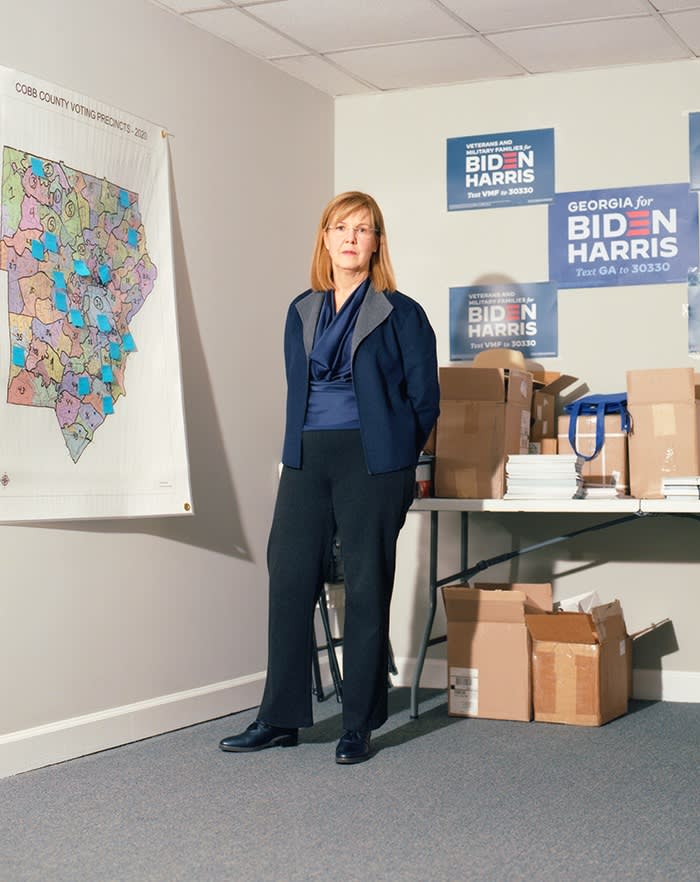
That political swing became even more vivid in 2020. Georgia helped to tip a bitter presidential contest to the Democrats, one of a handful of states that went for Joe Biden having four years earlier voted for Trump. It was the first time a Democrat had won the state since Bill Clinton in 1992 and placed Georgia squarely in that small class of “purple” political battlegrounds that decide the direction of US government.
Trump was so infuriated by defeat in erstwhile reliable Georgia that he put the state at the heart of efforts to overturn the result of the entire contest. He made a now-infamous phone call to Brad Raffensperger, the secretary of state, asking him to “find” more votes and, at a subsequent rally in Dalton, some 70 miles from Marietta, Trump vowed to “fight like hell” to keep the presidency. The loss also prompted Georgia’s Republicans, who control the state government and legislature, to enact a new law imposing further curbs on voting in a state with a history of suppressing black and minority votes.
After a hand recount, Biden eventually won Georgia by about 12,000 votes. In Cobb County, however, his margin of victory was almost 56,000 votes. Four years earlier, Hillary Clinton had only narrowly carried Cobb County and lost the state.
The metamorphosis hasn’t just occurred at the presidential level. In 2018, Stacey Abrams, a charismatic lawyer and activist, cemented her reputation as a rising star within the Democratic party when she came close to winning the state’s governorship. Abrams, who is African American, has been widely credited with boosting turnout and laying the groundwork for Biden’s win, as well as the crucial victories of Raphael Warnock and Jon Ossoff in run-off races for two US Senate seats that handed Biden a Democratic majority in Congress. Last month, Abrams confirmed she will renew her bid to become governor in 2022.
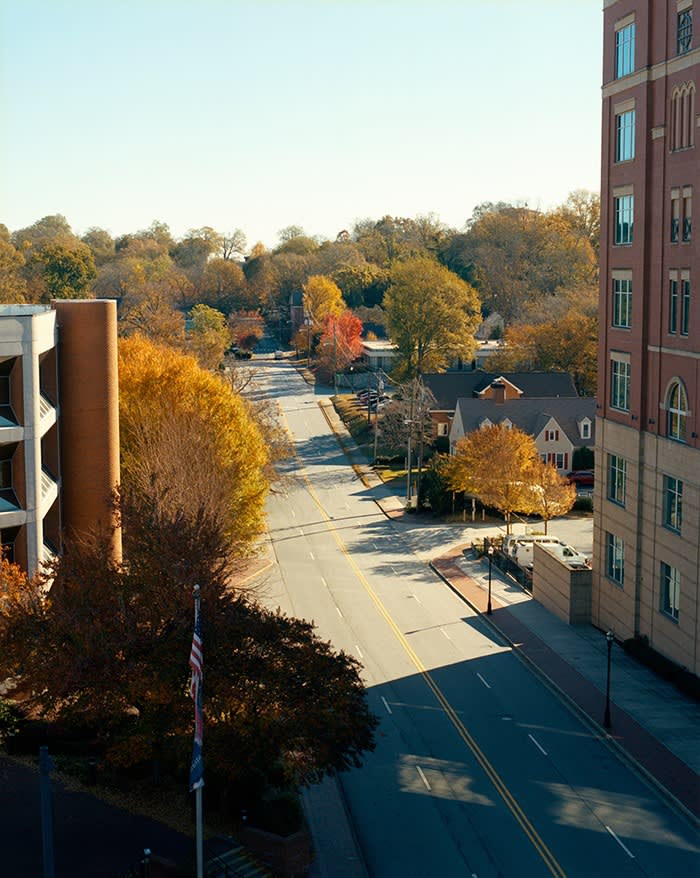
Which means that nationwide scrutiny about political preferences in places like Marietta will only grow next year. The questions will be: are recent swings permanent or temporary? And to what extent are they influenced by kitchen-table issues such as inflation, jobs and growth versus cultural ones around race, education and abortion? The answers may not be obvious. After all, Georgia has a long history of confounding traditional political taxonomy. Democrats here, including Stoner, continued to call themselves that long after the national party embraced progressive civil-rights legislation.
Sitting in a café that serves organic teas and kale salads, half a block up from the old Stoner house, Bettadapur tells me she was cheered by her party’s gains in the state but warns they could well prove fleeting. “In terms of the shift in thinking and culture, it’s been very encouraging,” says the 59-year-old. “But for every action, there’s a reaction, right? You’ve still got this Republican support, and we’ve seen that really get active since November of last year.”
I wanted to ask voters in Cobb County for their verdict on Biden’s first year, but also to ask Democrats how they were feeling about the future and to find out how Republicans planned to fight back.
One thing not in dispute: how decisive the fate of Georgia is for Joe Biden. As Democrats have lost ground to Republicans in more traditional swing states such as Ohio and Florida, it has become essential they build on their recently acquired grasp in states such as this one.
“It’s kind of exciting to have all eyes on Georgia,” says Jen Cox, a Democratic activist I meet in prosperous East Cobb. “And when it worked out in our favour, it was like, ‘Oh, thank goodness, we don’t want to let everybody down.’” She pauses for a moment before adding that the pressure’s on.
Georgia has always loomed large in American’s political imagination. It’s the state where southern Democrats opposing desegregation turned Republican in droves. The political home of former Republican House speaker Newt Gingrich, scourge of Bill Clinton. But in Atlanta and elsewhere it has been a symbol of a more modern South, one emotionally bound to notions of racial justice since the earliest days of the republic. Iconic civil-rights leader John Lewis, who died last year, represented parts of Atlanta for decades. This is just some of what was on my mind as I arrived in Cobb County and, as they say, it’s complicated.
The first time Kathy Kettering didn’t vote for a Republican presidential candidate was in 2016, when Donald Trump ran for office. “I can’t believe people have been bamboozled by him,” she says, adding that the former president is, among other shortcomings, “crass” and “conniving”.
We’re sitting in Marietta Square in the middle of town, where there is a fountain, a gazebo and a playground. Even in mid-November, Veterans Day decorations of American flags linger on. A museum dedicated to Gone with the Wind, the epic set against the background of the civil war and reconstruction, is nearby.
Kettering, a 69-year-old retired consultant for the insurance industry, says she started becoming sceptical of the Republican party after watching the impact conservative media had on her father. “He totally changed as he got older and opportunities closed for him. It was harder for him to find work,” she says. “I think the rightwing radio took over and made him bitter and made him angry.”
Kettering couldn’t bring herself to vote for either Trump or Hillary Clinton, but last year went for Biden and, so far, has no regrets. “I think that he’s got the right mindset, where he’s trying to do good.” She doesn’t agree with everything he’s done, notably the stimulus cheques of up to $1,400 that he sent out to Americans earning less than $75,000 a couple of months after he took up office. “I didn’t need it,” she says. “So I felt guilty getting it, and now I’m wondering if it kickstarted inflation.”
Under Biden, the US economy has rebounded from pandemic lows, with more than six million jobs created and gross domestic product expected to grow at a rate of 6 per cent this year, according to the IMF. In October the unemployment rate in Georgia fell to 3.1 per cent, below pre-pandemic levels.
Expanding opportunities are one of the reasons people have been attracted to Cobb County in recent years, along with good schools and its warm, hilly landscape. It’s now the third-largest county in Georgia with a population of 766,000. “This was a ghost town,” is Dani Guarino’s summary of her hometown before the influx. “It was all doll clothes, antique shops. Now there’s offices, branding agencies and restaurants — good ones.”

Guarino, 32, is sitting outdoors with her small dog at Cool Beans, a coffee shop around the corner from the square. The first time she was eligible to vote in a presidential race, in 2008, she voted for Republican John McCain. She later flipped to Barack Obama during his re-election campaign and has voted for Democrats since.
A graphic designer turned waitress and bartender, Guarino was hit hard by the pandemic. She was set to open a restaurant in Hogansville, south of Atlanta, in February 2020, but the project collapsed. In her case, early stimulus funds helped her to avoid making “hasty” decisions about returning to work, though she dismisses the notion that labour shortages are now holding back employment.
Guarino likes Biden’s policies. But she also worries that she will struggle to keep up with inflation, that housing has become too expensive for renters, and she still has $10,000 of student debt. “Everything they are talking about is great,” she says. “[But]I think Democrats don’t use power when they have it. We need tangible benefits.”
Others in Marietta believe that Biden and the Democrats simply need to be more effective in communicating their policies. Referencing Trump’s ability to dominate the media, Jon Epstein, a 53-year-old teacher, told me, “We have to capture that balance between hearing too much of a president and then not hearing enough.”
Some of this might sound familiar to Biden. At a similar stage in his vice-presidency, the Obama administration had pulled the global financial system back from the brink of the 2008 crisis and passed a major domestic stimulus. But the White House’s ineffectiveness touting these achievements ultimately led to a drubbing in the 2010 midterms, with Republicans ending unified Democratic control of Congress. Now, as president, Biden faces a similar problem. “I think that there’s a messaging vacuum,” adds Epstein. “And if the Democrats don’t fill it, the Republicans are more than happy to.”
To begin getting the local Republican take on Biden’s presidency, I stopped at the home of Jason Shepherd, until very recently the party’s chair in Cobb County. Shepherd, 46, has rejected Trump’s claim that the 2020 election was a fraud, a view that puts him at odds with many other Republicans.
Despite this split, he believes the GOP has a good shot at reclaiming lost ground across Georgia as long as they follow the playbook set by Glenn Youngkin, the former Carlyle executive who stormed to victory in the Virginia governor’s race last month. Youngkin did not refute Trump, nor did he embrace him. He also blasted Biden for excessive spending. “The last thing we should really be doing as Americans is just printing money out of thin air,” says Shepherd. “It’s affecting everything: what good is getting an extra cheque when the price of everything goes up? America’s a centre-right country, no matter how you look at it.”

According to the US labour department, the consumer price index for the Atlanta region rose almost two points faster than the national rate in October. Inflation was a popular refrain during my trip. “I don’t want to charge you and your family this much for a meal. But in order to run a profit, we have to,” says Jim Tidwell, the owner of two restaurants, a catering business and a window-replacement service in Marietta.
The economy is not the whole story. Over a barbecue lunch at the Battery, a new residential and commercial development that’s also home to the Atlanta Braves baseball stadium, Republican strategist Brian Robinson tells me he detects a social and cultural shift back to the right. Much of the rejection is showing up at local school boards, where Republicans have been fighting against mask mandates, Covid-19-related closures and what they see as an excessive focus on race, gender and sex in classrooms. These were also issues that Youngkin raised in Virginia.
“It’s this woke BS that’s driving a lot of this,” says Robinson, 46. “These are the educated suburban folks that abandoned Trump for Clinton and Biden. These are the people that a lot of Republicans thought were lost forever. They voted for Biden and maybe Abrams. But now they’re like, eeeesh, these people don’t speak for us.”
When I arrived in Marietta on November 15, the signs for Biden and his party were not looking good, with the president’s drooping approval numbers pinned on a range of issues, from the US’s chaotic withdrawal from Afghanistan, to protracted negotiations in Congress over his economic agenda. They have bounced back somewhat since, but polling on congressional preferences shows that Republicans have a strong chance of regaining control of the House and possibly the Senate in next year’s midterms. That would reinvigorate the Republicans going into 2024.
Feuding within the party remains a threat to Republican progress. Brian Kemp, the Georgia governor who got in Trump’s crosshairs after certifying the results of the presidential election, is facing a challenge from David Perdue, the former senator who is backed by Trump and says he would not have done the same. But among GOP voters I encountered, there was little sense that the party — or even Trump himself — should pay a price for trying to subvert the results of the vote, or even the January 6 assault. “I don’t think he had anything to do with it, I’d be surprised if he did,” says Kim Kornblatt, the owner of a flower and gift shop. She grew up a Democrat but is now firmly Republican.
Powder Springs, a predominantly African-American town of nearly 17,000 in the south-west corner of Cobb County, has been going through its own evolutions in recent years. “Just two years ago, there wasn’t a black-owned anything on this street,” says Janice Spencer, a 67-year-old retired finance-industry worker. “Now you have The Book Worm, Nibbles Kitchen, the ice-cream shop, the boutique next door and the wedding store — all black-owned.”
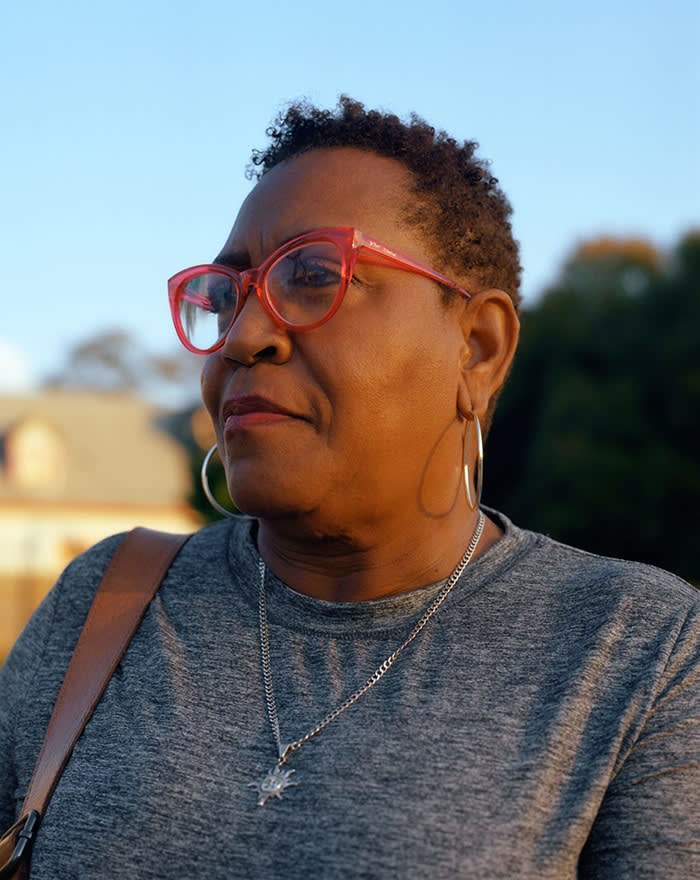
Reflecting on the progress made since her childhood, Spencer believes Covid-19 was just one more obstacle overcome. “I think that somehow it catapulted us forward as people. I have faith that we are not going to turn around now.”
One of the clearest signs that political shifts have been occurring at the local level was the 2020 election of Lisa Cupid to chair the Cobb County Commission. In her office overlooking Marietta Square, she weighs her words carefully. “Right now, we are under construction as a country. And for some people, it’s greatly inconvenient. But if we look at the opportunity on the other side, we’re getting ready to do some things that are really remarkable.”
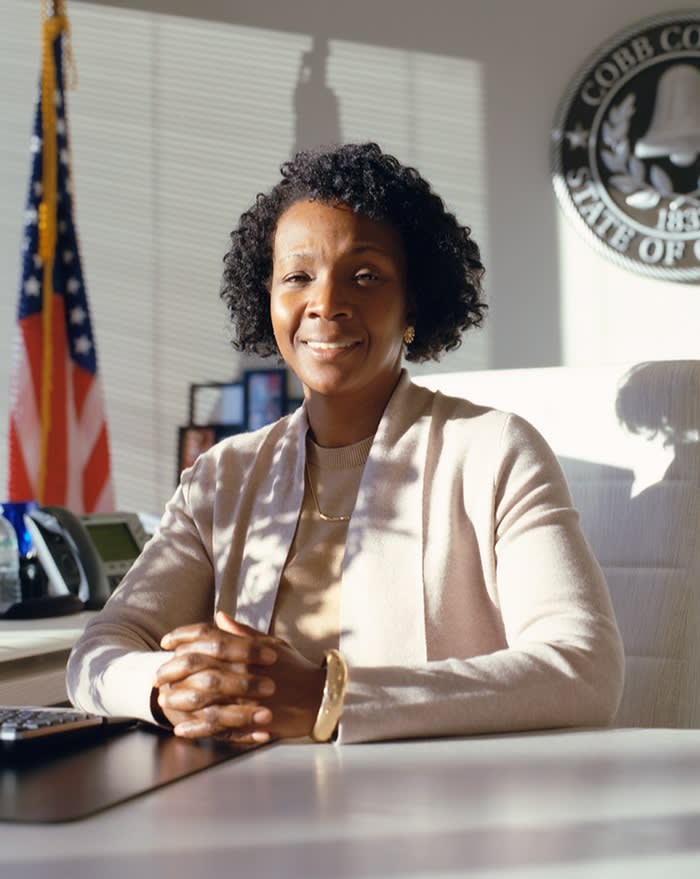
Despite her optimism, I sense some unease in Cupid’s assessment. It is, she says, still a challenge for black leaders to be able to “speak to your experiences and to speak to the challenges” and not be considered “divisive”. She is clearly disturbed by the local spats over schools, which seem to have worsened since she was a high-school student in the mid-1990s.
“Our schools are best when all our students are educated best and everybody can participate,” says Cupid. “I don’t know where that’s getting lost. I don’t know where we think we gain by fighting each other. We have so much more to gain by figuring out where our interests intersect.”
Many Georgia Democrats are still projecting optimism. “We’ve got to give [Biden] a chance,” says Tharon Johnson, a Democratic strategist in Atlanta and founder of Paramount Consulting. “I think you’ll see a drastic shift in his numbers not just in Georgia, but across the country, when people really settle in and look at what he’s been able to accomplish in the first year.”
But other observers say that the 79-year-old president, who was born in Pennsylvania and made Delaware his home, never built a deep enough political base in Georgia. “It’s not that Georgia voters really liked Joe Biden very much, they just wanted to get rid of Donald Trump,” says Kerwin Swint, director of Kennesaw University’s School of Government and International Affairs. “There’s no affection for Biden, there’s no real support for Biden. He just happened to be the guy.””
Cobb County’s Democrats will be hoping this assessment is wrong. But even among Biden’s most fervent supporters, there is trepidation about how tight his grip on Georgia and the White House will prove and what the best strategy is to hang on.
When Biden’s victory was finally announced on November 7 2020, four days after the election, Shannon Deisen, 48, banged pots, opened champagne and ran across the street to her neighbours in tears. A year later, her admiration for the new president is mixed with concern that he has not been forceful enough, particularly on legislation to protect voting rights. “I feel like his ideas about compromise are not effective,” she says when I visit her in the wealthy enclave of East Cobb one evening. “I mean, these people attacked our democracy . . . The people in Georgia who voted and canvassed and knocked on doors and made phone calls and stood in line here for 10 hours to vote — if they don’t see anything happen from that, why are you going to go stand in line again?”
Cobb’s Democratic party chair Bettadapur worries that the party has shifted too far to the left on some issues. Cox, the activist, agrees to a point. She thinks it’s crucial for Biden to focus on the immediate concerns of Americans who suffered through a pandemic, a recession and now an uneven economic boom. “You’ve got folks that can’t pay their bills who are listening to those really, really well-written emotional soundbites from the Republican party. And once that hits you, I don’t think you can hear the intellectual argument as to why the Democrats have a better plan,” she says. “If your basic needs aren’t being met, then how much do you want to discuss whether or not solar energy is the way to go?”
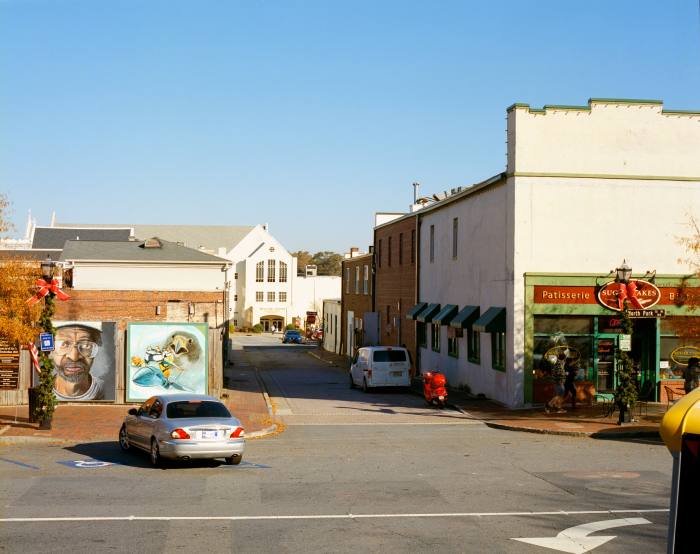
On his 100th day in office in April, Biden travelled to Duluth, in Gwinnett County, east of Cobb County. He came to thank voters for their support. “What did you do with your vote here in Georgia? Well, you changed America. You began to change America. And you’re helping us prove that democracy can still deliver for the people,” he said. He framed the question perfectly: has Georgia changed or merely begun to change? The fate of his presidency is, perhaps more than any other state, linked to the nature of Georgia’s political evolution.
He will hope that it goes the way of Colorado, which was captured by Obama from the Republicans in 2008 and never turned back. Democrats had banked on a combination of hefty stimulus, competent Covid-19 management and the contrast with an extreme, Trumpian opposition as a winning formula. But political reality can be messy and unpredictable. The pandemic rages on, Americans aren’t, so far, giving much credit to the White House for the economic recovery and national change doesn’t come easily. Even though Cobb is now a blue county, some white voters in conservative neighbourhoods still whisper when they speak about being Democrats. As one activist put it to me, there’s “a social cost” to it. But if Biden cannot hang on to the Atlanta suburbs, it’s hard to imagine him hanging on to the White House.
James Politi is the FT’s Washington bureau chief
Follow @FTMag on Twitter to find out about our latest stories first.
